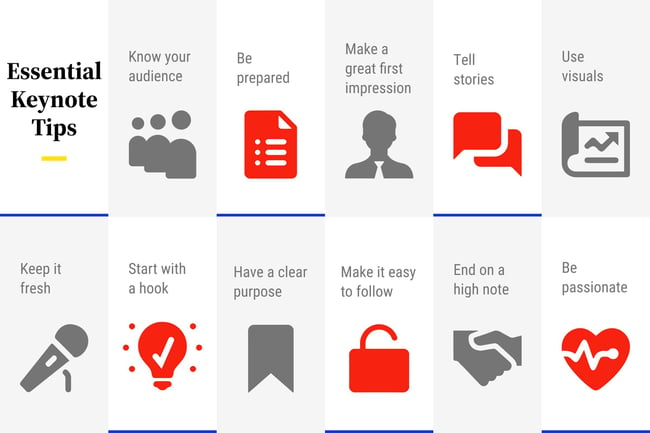Every keynote speaker knows the importance of delivering an engaging and inspiring presentation. However, there is more to being a successful keynote speaker than just giving a great speech. If you want to grow your business and brand, there are some essential keynote speaker tips you will want to follow both for planning and preparing your speech, and for growing your business.
The speech
Know your audience
It's important to tailor your speech to your specific audience. What are their needs and wants? What problems are they facing? By understanding your audience, you'll be able to deliver a speech that resonates with them.
Create value for your specific audience. Offer practical takeaways they can apply in their own lives or businesses.
Be prepared
It may seem unnecessary to say this, but you'd be surprised how many speakers think they can improvise in whole or even in part. You should always have a well-written speech that you've practiced over and over again.
Start by identifying your audience outcomes: what you would like them to know, understand, and/or be able to do when you are done. Don’t start writing until you are crystal clear on these goals for the audience. Then draft your outline, including stories, and write your piece. Best practice is to take your audience on an emotional journey with a series of highs and lows, leading to the climax of what you want to get across.
Once you have an impactful speech written, practice it on your own until it’s memorized, then try it out in front of a live audience. Bribe your family and friends to listen if you need to, or test it out in a speakers’ group. All the preparation will be worth it when you are completely comfortable with your presentation, and knock your audience off their seats.
Make a great first impression
When people walk into the room, you want them to feel like they're in for a treat. Be energetic and enthusiastic, and make sure your visuals are stunning.
Be aware that regardless of the type of public speaking you do - whether you are giving a keynote speech for a particular industry, or you were hired to be an inspirational speaker for a conference, or as a thought leader sharing a core message for business leaders - the way you present yourself in the first two to three minutes sets the tone for the rest of the speech.
Tell stories
Stories are a great way to connect with your audience and deliver an engaging message. People are more likely to remember a story than a list of facts. Stories are a great way to get and keep your audience's attention; they can picture themselves within the experience of whatever you're talking about, so it's "me" not "some other person." That always makes for a more powerful impression.
Use visuals
Visuals are another great way to engage your audience and ensure that your message is remembered. Use slides, infographics, videos, or any other type of visual aid to supplement your speech. Hire a visual designer to help you create a visual presentation second to none. It's well worth the time and money when it adds so much to your audience’s experience of your presentation.
Keep it fresh
Strive to create new and original content that keeps your audience coming back year after year. That means having a repertoire of standard speeches that can be adapted to different situations, as well as being available to customize a totally new speech on occasion (for an additional price).
Hook them from the beginning
Your audience will quickly lose interest if you don't capture their attention right away. You only have a few minutes to make a good first impression. So start your speech with a bang! Whether it's an inspiring story, shocking statistic, or humorous anecdote, make sure the beginning of your speech grabs attention and doesn't let go.
Have a clear purpose
Your purpose in speaking should be clear from the beginning so it's easier for your listeners to follow. It's good to include some surprises in the middle, but they usually occur within the overarching structure of the speech. Where are you headed? Why should your listeners care? What difference does this topic make for them, personally?
Make it easy to follow
We are not an oral-tradition society so it can be hard for people to stay focused when they aren't used to sitting and listening. Depending on the circumstances of your speech, you may need to do the old tried-and-true:
- Tell them what you're going to tell them
- Tell them your main ideas
- Tell them what you just told them
Nobody wants to listen to a long-winded speech, so be sure to keep your points concise and engaging.
End on a high note
Just as the beginning of your speech should be strong, so should the end. Your audience should know what you want them to do next. Whether it's buying your product, signing up for your newsletter, or simply learning more about your brand, make sure there is a call to action that is easy for them to follow. Leave your audience wanting more.
Be passionate
Share your excitement and energy with your audience, and they'll be sure to remember your speech long after it's over.

The business of speaking
Build a strong personal brand
Building a strong personal brand means creating a recognizable and trusted name for yourself in the speaking industry. You can do this by joining speakers' groups, and by creating a strong online presence.
Make sure your marketing materials (e.g. videos, photos, bios, etc.) are high quality and showcase your unique strengths as a speaker.
Differentiate yourself from other speakers in your field
What makes you unique? What can you offer that no one else can? Once you have answered these questions, make sure that your marketing materials reflect your unique selling points. Otherwise, you'll blend in with all the other speakers your clients could hire instead of you.
Develop a strong online presence
Your website should be the center of your online presence. It should be well-designed, easy to navigate, and full of engaging content. But your online presence doesn't stop there. You should also be active on social media, and you should make sure that your SEO is on point so that people can easily find you when they're searching for a speaker like you.
Optimize your website
Make sure potential clients can find you easily when they do an online search. This means your website must be designed with SEO in mind. That means using the right keywords, optimizing your photos, and creating fresh content on a regular basis.
Be professional
Some people get a reputation for being difficult to work with. No matter how brilliant you are, if you don't make it a pleasure for clients to work with you, you will struggle to get clients. Being "professional" includes such things as: not bad-mouthing anyone behind their backs; being prompt and responsive to emails; showing up on time (or early) for appointments and events; speaking to people with thoughtfulness and grace; and dressing appropriately.
Create informative and engaging content
Your website should be full of blog posts, articles, infographics, and other resources that will help your audience learn more about you and the topics you speak on. This content will not only attract new clients, but it will also help you stand out as an expert in your field.
Keep your website and social media presence up-to-date
This is essential for building trust with your audience. If someone visits your website and sees that the last blog post was from two years ago, they're going to question your authority. Similarly, if you never update your social media accounts, potential clients will wonder if you're still an active speaker.
Be active on social media
Social media is a great way to connect with potential clients and build your personal brand. Post interesting articles, share photos of you speaking at events, and engage in conversations with others in your field. But be sure to avoid self-promotion, as this will turn people off.
Network with speakers and industries
Relationship building is the name of the game when it comes to growing a business. Connect with other speakers through speakers associations and groups. Share ideas and best practices and give each other referrals. You're not competing because most businesses who hire one guest speaker usually hire others.
Also connect with people across industries by attending events and conferences. Many author keynote speakers benefit by meeting people just outside the industry where they would normally speak.
Stay true to yourself
Be sure to remain true to your values, as this will help you build a strong and loyal following of clients and audiences who love to connect with you. If you think you need some additional professional or personal development in any particular areas, make the investment.
Have a strong message
A strong message gets to your "why", your purpose. Who are the people you are trying to help? What is their big problem? How can you help them solve that problem? Think about your message as your USP: Unique Solution to a specific Problem.
A great speech is about more than just delivering information; it's about inspiring people to take action. So what do you want your audience to do after hearing your speech? Make sure your message is clear and that it resonates with your audience.
Don't be afraid to be different
The best speeches are those that challenge the status quo and get people thinking. It may mean being a bit controversial. It certainly means being thought-provoking.
Don't be afraid to take risks and push the envelope. This is what will help you stand out from the crowd and make you a successful keynote and motivational speaker.
Follow up with your audience afterward
In some cases following up means connecting with all your audience members individually, and in some cases it means connecting with the leader who hired you. Send additional resources or find out what they may be working on next.
As you follow these tips and strategies remember that it takes time, practice and dedication to become the very best and then to stay at the top over 20 years or more. Always remember that it's "not about you"; it's about the people in your audience who get to hear your amazing speech, with a message that could make a huge difference in their lives.








